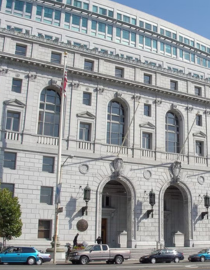
UC Berkeley Law Dean Erwin Chemerinsky, Professor Rebecca Wexler, and Criminal Law & Justice Center Executive Director Chesa Boudin recently filed an amicus curiae brief in a case now before the California Supreme Court that turns on whether a federal law prevents criminal defendants from subpoenaing evidence they need to defend themselves.
The brief, signed by 20 other law professors — including UC Berkeley Law Professors Colleen V. Chien ’02, Andrea Roth, Jeffrey Selbin, Elisabeth Semel, and Jonathan Simon J.D. ’87 Ph.D. ’90 — addresses the efforts by Adrian Pina, who’s accused of murder, to subpoena the deceased’s online posts and communications to support his argument of self-defense.
Meta, which owns Facebook and Instagram, and Snapchat parent company Snap fought Pina’s subpoenas, arguing that the federal Stored Communications Act (SCA), a privacy law that predates the advent of social media, bars them from handing the information over. Both the initial trial court and a state appeals court have sided with Pina, pushing the case to California’s highest court.
Chemerinsky, Wexler, and Boudin argue in the brief that the SCA’s silence on the situation posed by the case and whether it should trump California law should be read to infer that it doesn’t preempt the state’s evidence and criminal subpoena rules.
California law calls for courts to balance the competing interests — including privacy — against a defendant’s need for the information, they write. Accepting Meta and Snap’s assertion that the SCA should stop that process would effectively gut the subpoena power and “make meaningful defense investigation impossible in a growing percentage of cases,” they write.
“This Court should construe the Stored Communication Act’s ambiguous silence on criminaldefense subpoenas as consistent with California’s carefully crafted criminal procedures,” Chemerinsky, Wexler, and Boudin write. “The SCA should not be read as an unqualified, absolute bar on subpoenas for information that happens to be transmitted over the internet.”